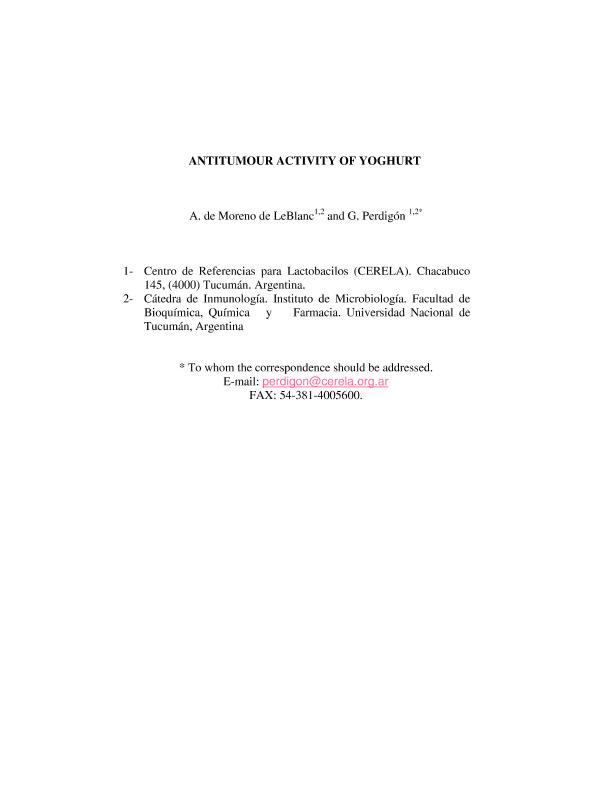Artículo
Antitumour Activity Of Yogurt
Fecha de publicación:
06/2006
Editorial:
Nova Science Publishers
Revista:
International Journal of Cancer Research and Prevention
ISSN:
1554-1134
Idioma:
Inglés
Tipo de recurso:
Artículo publicado
Clasificación temática:
Resumen
Several studies have demonstrated that fermented milk consumption decrease the incidence of colorectal cancer. Using a chemically induced murine colon cancer model it was reported that conventional yogurt inhibits tumour development. In this model, the inflammatory immune response caused by the carcinogen (DMH) showed a great increase in IgG+ B cells, CD8+ T lymphocytes and in proinflammatory cytokines (TNFá and IFNã). Yogurt feeding inhibited tumour development by decreasing the inflammatory immune response and increasing the number of IgA+ cells, CD4+ T lymphocytes, cytokines such as IL-10 and decreasing NO radicals. Yogurt also induced the apoptosis mechanisms. The local immune stimulation produced by yogurt feeding increased monocytes/macrophages population and the cytokines release in the nodular tissue and in the Peyer’s patches suggesting that these cells could be responsible for IFNγ and TNFα production. The enhancement of IL-10 found would favour the regulation of the immune response, not only in the inhibition model of the tumour growth, but also when yogurt is given long term. The immune mechanisms involved by yogurt to decrease the inflammatory immune response caused by the carcinogen were different to those observed with an antiinflammatory drug (indomethacin). Indomethacin did not increase immune infiltrative cell activity in the large intestine and the cytokine levels were diminished. Nitric oxide synthase enzyme determinations showed that in mice fed with yogurt, the IFNγ enhancement was not related to inflammation, but to an immunomodulation. We demonstrated that the only single yogurt supplementation was unable to inhibit tumour development in the initiation stage, however it inhibited the tumour growth (promption and progression) when it was administered cyclically after tumour induction. Cellular apoptosis increase observed could explain the importance for the TNFα levels found in the mice fed long term with yogurt. The normal microflora has an important function in the intestinal inflammatory process preceding tumour development, lactic acid bacteria present in yogurt play a role in this process since it has been shown that these bacteria and fermented milk products act on the microbial enzyme activities associated with colon carcinogenesis. This chapter will show that yogurt can inhibit the promotion and progression of chemically induced colon cancer in mice through its antiinflammatory effect, cell apoptosis and by its immunomodulating properties
Palabras clave:
Yoghurt
,
Colon Cancer
,
Antitumour Response
Archivos asociados
Licencia
Identificadores
Colecciones
Articulos(CERELA)
Articulos de CENTRO DE REFERENCIA PARA LACTOBACILOS (I)
Articulos de CENTRO DE REFERENCIA PARA LACTOBACILOS (I)
Citación
de Moreno, Maria Alejandra; Perdigon, Gabriela del Valle; Antitumour Activity Of Yogurt; Nova Science Publishers; International Journal of Cancer Research and Prevention; 2; 3; 6-2006; 181-193
Compartir




